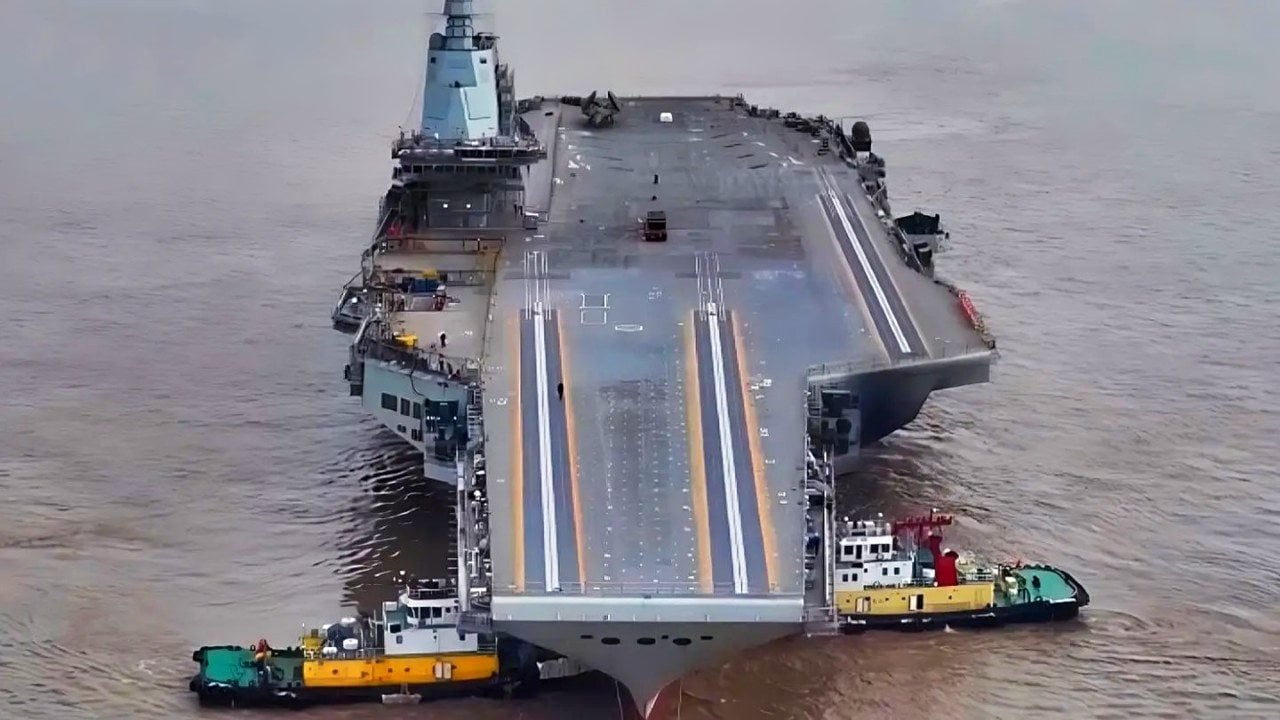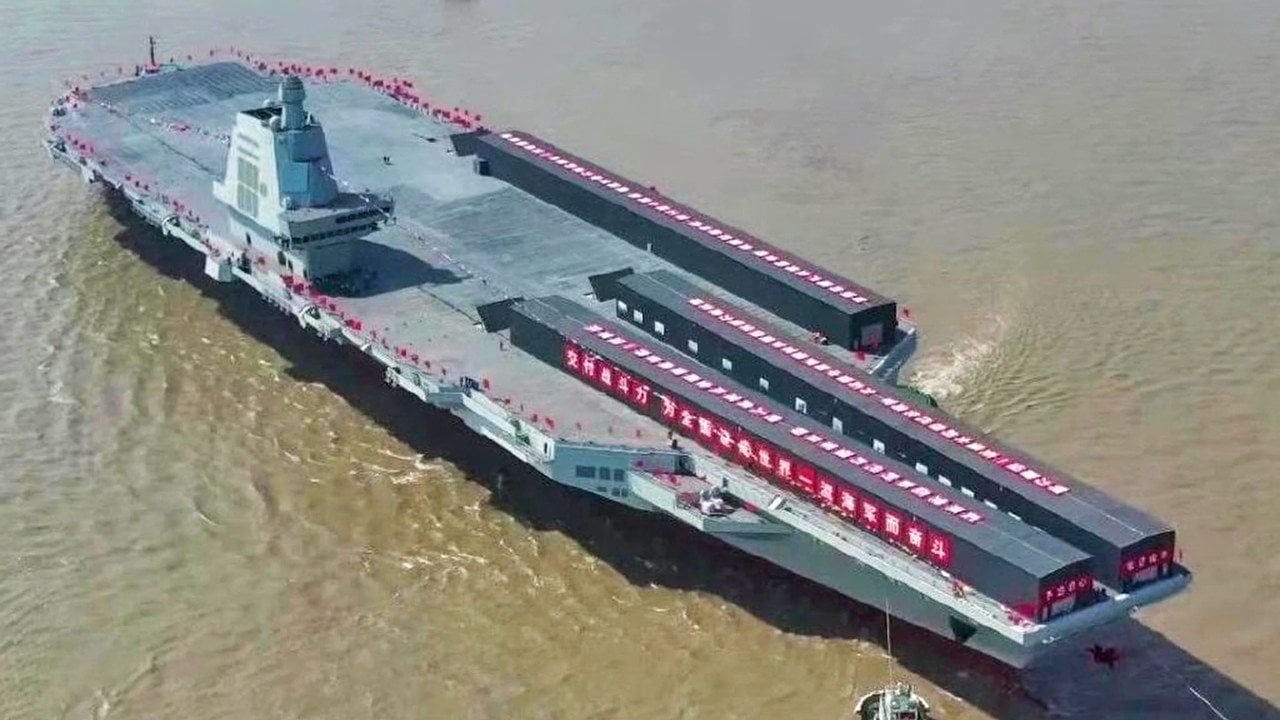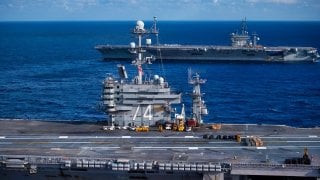What If China Chooses to Blockade Taiwan Rather Than Invade?
There’s a debate raging in defense circles about how China plans to press forward with its goal to take Taiwan. Some believe the People’s Republic of China is readying to conduct a massive amphibious invasion of Taiwan. But there is also the possibility China might consider a blockade.
There’s a debate raging in defense circles about how China plans to press forward with its goal to take Taiwan. Some believe the People’s Republic of China is readying to conduct a massive amphibious invasion of Taiwan.
Others experts, notably in the U.S. Navy, challenge this assessment. They think that the Chinese will use a slower, more methodical method to reabsorb Taiwan, deploying a long-term blockade. This would be supplemented by other non-kinetic approaches such as economic pressure and cyberspace brinkmanship.
China is developing the means to hit Taiwan hard and fast. I remain convinced that Beijing has the capabilities to attempt an amphibious landing this year. That would be a very big risk, however, for Chinese President Xi Jinping, who is already feeling political pressure at home after his failed economic policies and disastrous COVID response protocols.
Reasons Against Invasion of Taiwan by China
While a full-scale war would certainly rally the country under Xi, it remains a major unknown whether the Chinese could achieve victory over the island – at least before people at home started turning against the war.
It should be noted that, while Beijing views Taiwan as a breakaway province, most Chinese and Taiwanese view each other as culturally Chinese. (Specifically, Han Chinese.) What’s more, both China and Taiwan place a premium on the lives of their sons.
If the war were as violent as many analysts believe, it could destabilize the close-knit familial culture of China, thereby risking Xi’s continued tenure as supreme leader of the PRC.
Plus, China has placed a premium on developing and honing its asymmetrical or unconventional warfare capabilities. We’ve already seen this play out in a variety of ways over the last decade, from illegal island-building in the South China Sea and sustained cyberattacks against Taiwan’s infrastructure, to the deployment of Chinese Coast Guard vessels throughout the region to harass the Philippines, Japan, and Taiwan.
These are not overt declarations of war. But they are all aimed at one thing: undermining and sapping the ability of a targeted nation, such as Taiwan, to resist China’s aggression in the long run.
A Blockade Would Be In Keeping with China’s Hybrid War Doctrine
A blockade, while technically an act of war, would likely not militate a distracted and weak West against China’s military the way a more conventional amphibious invasion would.
Western sources insist that the U.S. Navy has the weapons to devastate any Chinese blockade force around Taiwan. But this would escalate the conflict. It is doubtful that U.S. leadership would choose such a path unless the United States were directly attacked by Chinese forces.

Yet a blockade of Taiwan would have dire consequences, not only for the Taiwanese people, but for the world.
The Economic Costs of a Blockade
A recent report that modeled the impacts of a Chinese blockade of Taiwan showed severe ramifications. According to this report, a blockade followed by Western sanctions on China would result in a $5 trillion loss of global gross domestic product.
U.S. GDP would decline by about 3.3%, while China’s would fall by 8.9%.
Of course, an authoritarian society such as China doesn’t have to worry as much about economic pain, because the rulers of China don’t have to deal with elections. Chinese leaders can, however, be overthrown. And if Xi does overestimate his chances and fries his economy in the process, he might be removed from power. But China has endured much in the name of making political points.
Taiwan produces roughly 46% of the world’s semiconductors. These are the computer chips that make most modern technology run. A blockade of Taiwan would break the supply chain for semiconductors, with negative downstream impacts on just about every other industry, including the automotive industry. This could send Western economies spiraling into a recession.
China knows this.
Beijing’s strategists would see a blockade as a calculated risk. Their opponents who would be forced to kowtow like the tributaries of old to the new Chinese emperor, Xi Jinping. Otherwise, their access to high-tech devices would be decimated, and their economies would take years to recover.
China’s goal would be to keep hostilities between itself and the West just under the threshold of total war, while still achieving its goal of collapsing Taiwan’s democratically elected government and reabsorbing the island fully into the PRC without major military challenges from Taiwan’s supporters.
Yes, a blockade is technically an act of war under international law. But that did not stop the John F. Kennedy administration from imposing one around Cuba during the 1962 Cuban Missile Crisis. The world played along for fear of what might happen if they did not. Similarly, whatever the world says about blockades being acts of war, will any of the major powers risk retaliation against China? Or will they attempt diplomatic solutions with economic inducements?
The latter is more likely. That is precisely why Beijing might prefer the slow strangulation of Taiwan rather than a sudden, bolt-from-the-blue attack.
What Would the West Do?
As for retaliation from the Western alliance, it’s true that the United States could (and should) work with its allies to conduct a greater blockade of the Malacca Strait, where much of China’s goods travel through on their way to Chinese ports.
Yet for the last several years, Xi has striven to make China resilient to sanctions and blockades. That is why the parks of some major cities in China have been converted into farmland. It’s why Xi’s government has taken actions to consolidate state control over strategic Chinese business ventures, even though the moves are economically damaging.

This also explains the growing trade alliance between China and Russia, a major commodities exporter and another nation under pressure from the West.
Of course, the blockade of Taiwan will not be the end of problems. Beijing’s ultimate goal will be to invade, but only after they’ve weakened the country and made the population so desperate that it will essentially welcome any reprieve from the brutal blockade.
Such a strategy, while still risky, would be the one to watch out for. It brings to the forefront all of China’s hybrid warfare techniques. The West may be in for a protracted crisis – one that stymies its ability to respond with overwhelming force, and methodically pursues a Chinese victory.
About the Author
Brandon J. Weichert, a National Interest national security analyst, is a former Congressional staffer and geopolitical analyst who is a contributor at The Washington Times, the Asia Times, and The-Pipeline. He is the author of Winning Space: How America Remains a Superpower, Biohacked: China’s Race to Control Life, and The Shadow War: Iran’s Quest for Supremacy. His next book, A Disaster of Our Own Making: How the West Lost Ukraine, is due October 22 from Encounter Books. Weichert can be followed via Twitter @WeTheBrandon.


